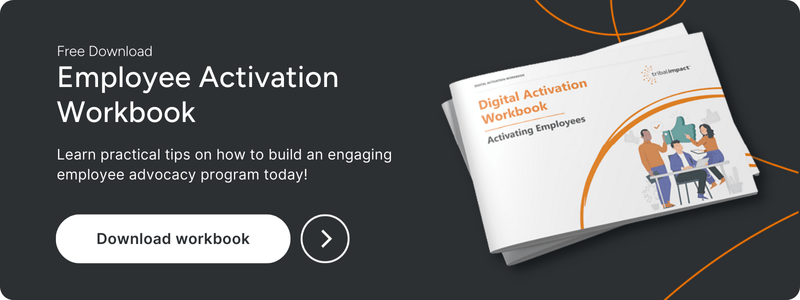When I think of social media and who drives it forward in a business, I generally think of marketing. Social media strategy and execution typically sit within the marketing team. However, no marketing team is an island and smart b2b marketers, in particular, should be thinking of how they can work cross-functionally to create a truly social business.

What’s A Social Business?
At Tribal, we believe in social business, not social siloes. Social businesses empower and enable employees to tell their brand story online. There’s a lot of talk of social selling and sales and marketing alignment (check out the Tribal Sketch Sarah did on this on our video page). And yes, absolutely, social selling is vital for modern sales and the social business.
However, to truly be a social business, you need to raise voices across your brand in any department and at any level. In a nutshell, you need employee advocacy. Employee advocacy works and HR is a needed ally that may hold the key to unlock a successful employee advocacy program and social business transformation.
Why HR? What Do They Know About Social Media?
HR owns learning, development and talent management
Try rolling out an Employee Advocacy program without training and watch it fail. Your employees need training and guidance to make your advocacy program a success. This needs budget, will marketing cover the cost? Probably not. If you want employees to raise their profile and the profile of your brand, you need HR on side. A collaboration with HR ensures your advocacy training is on the wider training agenda and funded. It’s not just about money and time. HR teams are pitched training programs day in and day out – they can help you select a training partner that fits your business learning needs and culture.
HR has oversight of any HiPo employees or fast track programs
Running a trial advocacy program gives you valuable learnings and data before you launch a full roll-out and a HiPo or a fast-track development group are a prime audience to trial with. This group is generally diverse in background, skillset, experience, role, etc. What they have in common is that they’re your brand’s next-generation leaders and generally keen to learn and progress. A terrific audience to test the advocacy waters with. HR can help you access this group and their development track.
HR is a valuable source of employee centred content
Branded social content should be a healthy mix of product, service and a look behind the scenes. Have a group of new hires starting? Content. Raising money for charity? Content. Team-building event? Content. In-house training? Content. Events like International Women’s Day or Pride? Content. Marketers need content and strong relationships with your HR team will keep communication open and another content source flowing.
HR is a likely source of Social Media superstars
In my experience, my friends and colleagues in HR have been some of the most socially savvy people in the business. Maybe it’s the nature of their roles, but I’ve seen many in HR set the bar high and show real social maturity. Often sharing insights relevant to their field and actively cheering on colleagues. When rolling out your employee advocacy program, you need a few stars who can lead the way and show what good looks like – you might find them in HR.
HR is always part of the C-suite
When it comes to launching an advocacy program, you’re going to need support from the C-suite. Your HR leaders can be a powerful ally in the boardroom. An activated employee advocacy program has many benefits that will support the traditional realm of HR. Increasing employee engagement and reducing the cost of recruitment are two examples. Remember, it’s not just marketing or sales who benefit from a strong, healthy employee advocacy program – HR will benefit too. Be sure that your HR leader knows what’s at stake.
Social business transformation isn’t the role of one team or one department and employee advocacy is only one element of a social business. Everyone in your business must think social. As with digital transformation, it’s a mindset shift, not a project to complete. And as marketers, we must challenge ourselves to think and collaborate wider – including our colleagues in HR. We probably have more in common than we initially thought.
